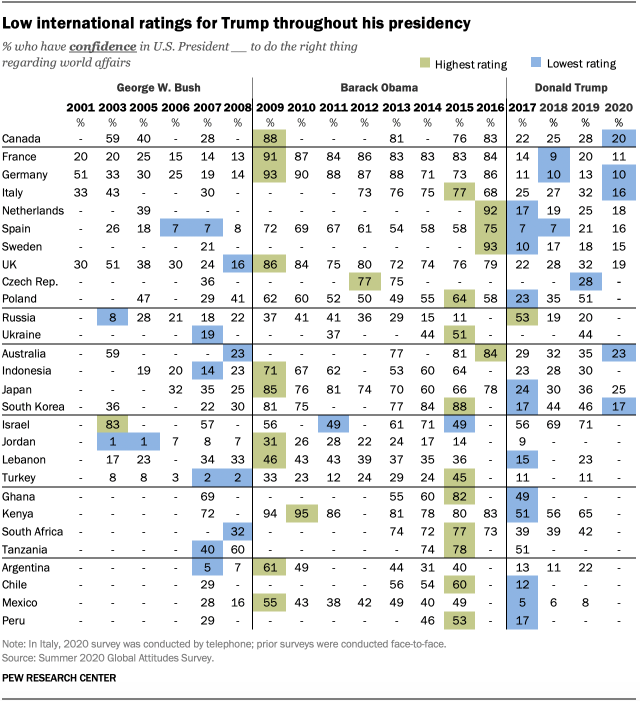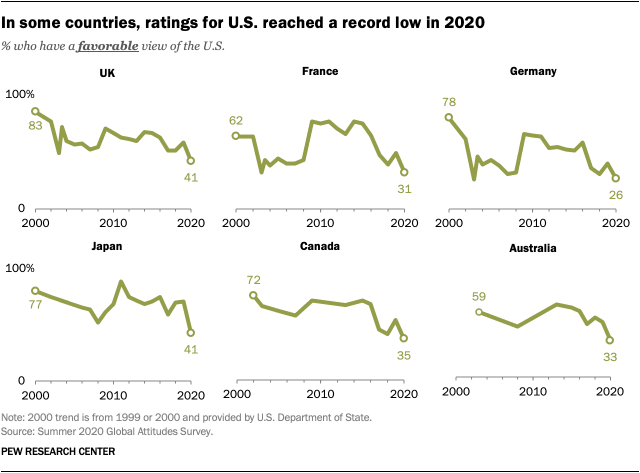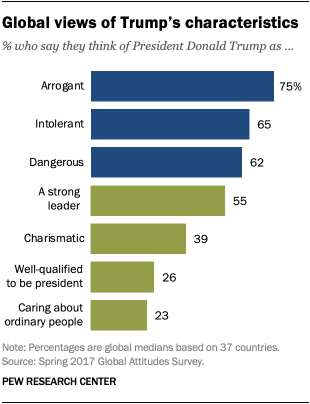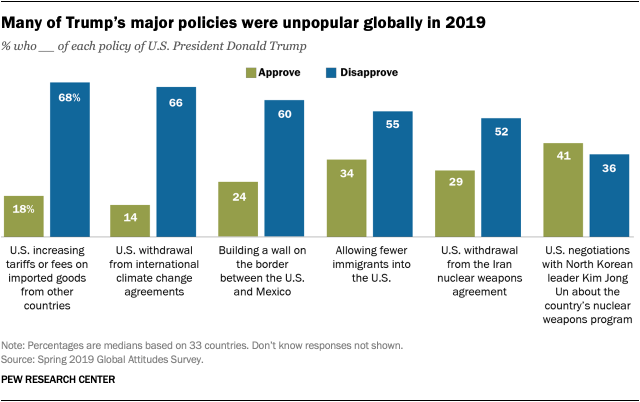Many world leaders were quick to offer congratulatory messages to President-elect Joe Biden after his victory in this month’s U.S. presidential election. They included Germany’s Angela Merkel, Canada’s Justin Trudeau and others who have had tense relations with President Donald Trump. Citing Biden’s commitment to rejoining the Paris climate accord, France’s Emmanuel Macron suggested it is now possible to “make our planet great again.”
The French leader’s sentiments are probably shared by many ordinary citizens around the world. In international surveys conducted by Pew Research Center over the past few years, Trump has generally received lower ratings than either of his two predecessors – Barack Obama and George W. Bush – with relatively few people approving of his handling of international affairs.
Indeed, no more than a quarter of adults expressed confidence in Trump in any of the 13 countries surveyed by the Center this year. And in many nations where we have survey data for the past three administrations, the lowest ratings we’ve seen for any president have come during Trump’s time in office. For instance, just 5% of Mexicans voiced confidence in Trump’s leadership in 2017, the smallest share who expressed that view in surveys that date back to 2007.
Trump’s unpopularity has had a significant negative effect on America’s overall image. Ratings for the United States plummeted after he took office in 2017, and they have declined further over the past year, at least in part due to the widespread perception that the U.S. has handled the coronavirus pandemic poorly. In fact, in several nations that are key U.S. allies and partners, the share of the public with a favorable view of the U.S. is at its lowest point in nearly two decades of polling.
For example, just 41% of adults in the United Kingdom expressed a favorable opinion of the U.S. this year, the lowest percentage registered in any Center survey there. In France and Germany, ratings for the U.S. are essentially as low as they were in March 2003, at the height of U.S.-European tensions over the Iraq War. U.S. favorability also reached all-time lows this year in Japan, Canada, Australia, the Netherlands and Sweden.
What have people around the world not liked about Trump? Our 37-nation survey in 2017 found that many did not like his personal characteristics or leadership style. Majorities said he was arrogant, intolerant and dangerous. Few considered him well-qualified or believed that he cares about ordinary people.
There has also been considerable opposition to many of Trump’s policies, including his administration’s withdrawal from climate change agreements and the Iran nuclear deal. Trump’s efforts to make it more difficult to enter the U.S. have also been widely unpopular.
Across 33 nations surveyed in 2019, a median of 55% disapproved of the U.S. allowing fewer immigrants into the country; just 34% approved. A median of six-in-ten opposed building a wall on the U.S.-Mexico border. And majorities opposed Trump’s efforts to erect trade barriers in addition to physical barriers, with a median of nearly seven-in-ten (68%) disapproving of increased U.S. tariffs or fees on imported goods.
While America’s image has suffered during Trump’s presidency, the U.S. still has many “soft power” assets. For example, people around the world generally still embrace U.S. popular culture: A median of 65% of adults across 37 countries polled in 2017 said they like American music, movies and television.
And people still mostly associate the U.S. with the idea of individual liberty, although there has been a decline on this front in recent years. The share of adults who believe the U.S. government respects the personal freedoms of its people has dropped in many nations recently, including Germany, Canada and Australia. While this decline has continued during Trump’s presidency, it began during the Obama era. (The first decrease on this measure occurred between 2013 and 2014, as news broke about the U.S. National Security Agency’s surveillance around the world. We saw further declines in 2015 following protests in Ferguson, Missouri, in response to the police killing of Michael Brown in August 2014.)
It’s too soon to know the extent to which a new president and new policies can turn around America’s battered image, but a change like this has happened before. After years of relatively poor ratings during the Bush administration, views of the U.S. improved significantly in many regions after Obama took office in 2009. Obama’s policies weren’t uniformly popular over the course of his presidency, but people generally saw his approach to world affairs as more multilateralist than Bush’s, and ratings for the U.S. remained relatively high in most nations throughout his tenure.




